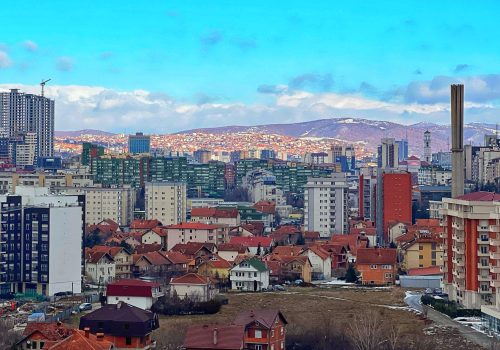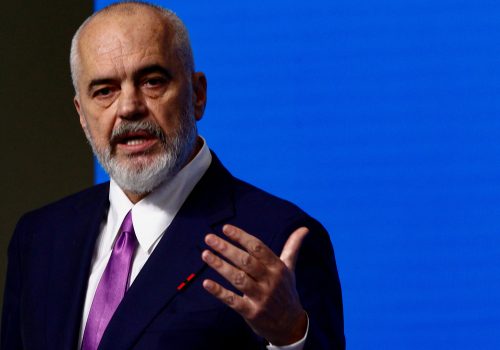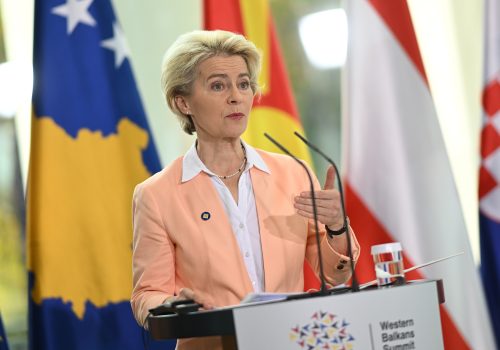Up for grabs? The Western Balkans’ aging energy systems place it between East and West
The Dinaric Alps that span the Balkans have the highest precipitation levels in Europe. The significance of this natural resource was recognized by the Marshall Plan for Europe in 1947, but its potential has been systematically undermined since the 1970s in favor of lignite-fired power plants. Today, the area’s existing and potential hydropower capacity will determine Central Europe’s ability to deploy intermittent renewable energy to (sustainably) reduce its dependency on Russian natural gas. Use of this massive strategic resource depends on a self-sufficient local electricity market and reforestation of the territory, both of which are dependent on the quality of local governance, which is influenced by external interests. This article highlights the massive opportunity of unlocking the Balkans’ capacity to bolster European energy security and the unfathomable cost of the failure to act.
An actionable plan
The Energy Community Treaty (EnCT) has thus far failed to deliver on its critical material obligations. However, it provides the only legal framework that (at least nominally) links the Western Balkans to the EU energy market. It is crucial to preserve the EnCT and restore its material obligations in a context that includes the Paris Agreement (reached at a UN Framework Convention on Climate Change Conference of the Parties in 2015), and with a refreshed understanding encompassing environmental impacts and human rights, the current and likely future energy security situation, and geopolitical realities. A thorough evaluation of reality and a newly upgraded and relevant treaty are urgently required. The UN, the United States, the World Bank, and the EU—which convened in 1999 to 2005 within the framework of the Stability Pact for Southeastern Europe (the predecessor to the RCC) to create the EnCT—have the capacity to initiate this process.
In its role to decarbonize the Western Balkans and rebuild Ukraine’s energy infrastructure, the EnCT will need to facilitate the largest investment undertaking in a generation with the potential to alter Europe’s energy supply for a more resilient and sustainable future. To make this sensitive task more feasible, the EnCT Secretariat, currently in Vienna, should be relocated to a NATO member state to ensure that delicate planning can take place in a secure environment.
A roadmap of the accession of the Western Balkans to EUETS by 2026 and use of the carbon-credit allocation mechanism through 2034 is necessary to overcome uncertainties and facilitate investments. In order to avoid the shortcomings evident in use of a similar mechanism with Central Europe, allocation of EUETS allowances for decarbonization (or, effectively, coal phaseout) of the energy sector within the EUETS system must be handed over to particular plant operators in the Balkans, in line with effective decarbonization plans and commercial commitments to execute them. Following the principle of additionality, these plans should combine into a much higher ambition of decarbonization than is currently expressed by the national energy and climate plans (NECPs). Once a carbon-intensive plant is phased out, a proportion of allowances could be sold at the EUETS market to European operators, who are making five times more economic value per ton of CO2 than in the Balkans. Sustainable energy portfolios would emerge rapidly. It is only sustainable energy—not simple combustion of lignite—that is suitable to support “nearshoring” of both manufacturing and provision of strategic materials and rare earths to the Balkans.
There is a hope that, this time, the EU is going to “walk the walk” following the president of the European Commission’s announcement of “Rule of Law Reports” for countries in the accession process. Addressing the rule of law, fiscal discipline, and the environmental violation of human rights may set the stage for an improvement in the quality of governance.
However, proper facilitation and conditions for investments are not enough. An EnCT decarbonization roadmap needs to be augmented by actual physical interventions. Actual investment opportunities must be formulated to ambitiously exceed the nominal NECP. It will require the leadership of the transatlantic community, a keen understanding of strategic implications, and deployment of the most modern technologies and commercial wisdom to make it happen. Herein lies a call to action: bring the public and private power generation companies of the Western Balkans to the table. Present them with the opportunity to be a critical part of the solution. Operators of the region’s power systems have suffered from systemic underinvestment, with technical failures getting more frequent. These stakeholders, not their governments, are now struggling for survival. For them, the fight for energy security is one that impacts the future of their families, their communities, and their employment. They have skin in the game to make the best use of domestic resources, avoid import dependencies, bring hydropower to the European market, deliver heat and power to domestic customers, and fight bad governance. They need a commercial opportunity beyond “just transition funds.” They need the opportunity to secure meaningful investment. Funding private sector-led opportunities from existing commercial export credit and decarbonization funds is a realistic option.
European public funds and the Regional Climate Partnership involving Germany and six Western Balkans states present a great opportunity to overcome energy poverty in the region. If effectively planned and executed, it could reduce network losses by one-third and introduce sustainable and clean energy to households and local communities: this would improve the lives of millions of people and bring them toward European integration. It is not about raising awareness further but about actual projects that will clean the air.
Synchronized deployment of these commercial and public funds would create an opportunity for European industry as well. It would respond to the EU Economic Growth Plan for the Western Balkans by better targeting and further mobilizing commercial funds. It would increase technological sophistication while raising demand for advanced technology and equipment that US, UK, Japanese, South Korean, and European industry could deliver. It is a real opportunity for reindustrialization.
It is now time to cancel the alternative that involves outsourcing energy security. It is up to key stakeholders to devise specialized institution and give birth to a framework that will deliver this much-needed change.
Related content

The Europe Center promotes leadership, strategies, and analysis to ensure a strong, ambitious, and forward-looking transatlantic relationship.
Image: European Union and Western Balkans leaders' summit, in Brussels, Belgium December 13, 2023. REUTERS/Johanna Geron


